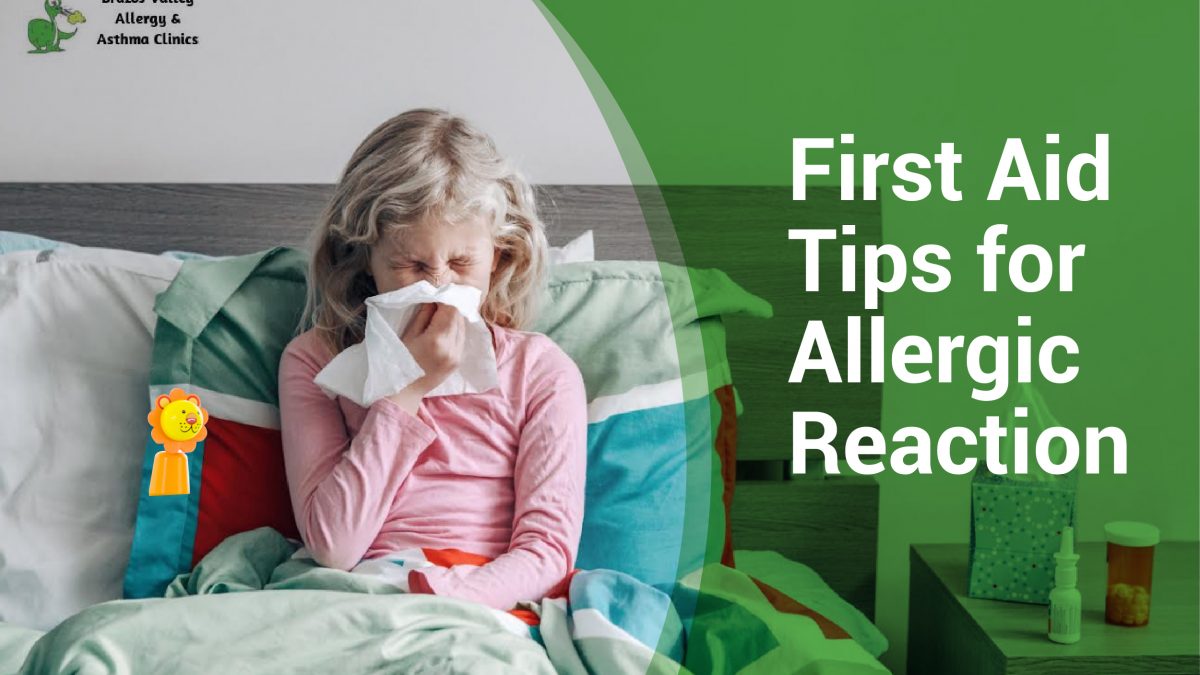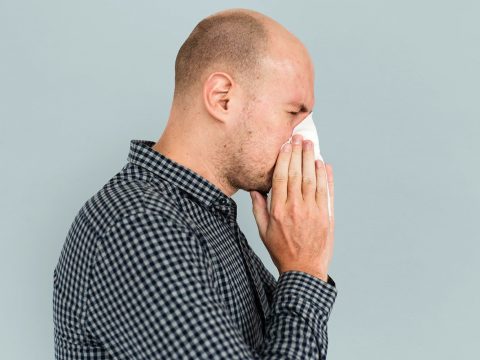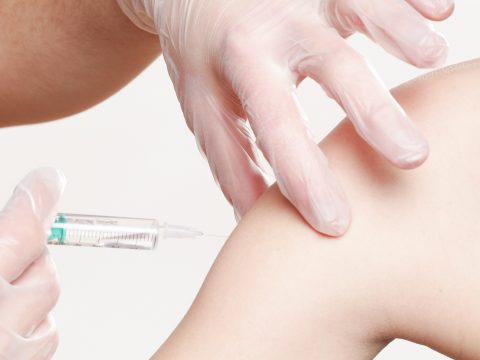- 979-485-9287
- office@bvallergy.com
-
 979-251-7804
979-251-7804
First Aid Tips for Allergic Reaction

Tips to More Restful Nights With Allergy and Asthma
October 1, 2021
How to Allergy-Proof Your Home
October 28, 2021
Some people can have severe allergies to specific foods, chemicals, and medication. However, severe allergic reactions can be fatal and require immediate medical assistance. That’s why knowing how to give the first aid allergic reaction is vital as it could potentially save a life.
Common Symptoms for Allergic Reactions
Your body’s allergic response depends on your allergy type and triggers. Most people have mild reactions. For example, inhaling pollen may cause you to have a runny nose, or you might develop red rashes if you have a skin allergy. Here are other symptoms of an allergic reaction:
- Allergic Rhinitis: Sneezing, runny nose, and nasal congestion
- Itchy, red, watering eyes
- Wheezing
- Chest tightness
- Swollen lips
- Stomachache
- Dry skin
- Shortness of breath with cough
- Red rashes
About one in 50 Americans suffer from the most severe allergic reaction, which is called anaphylaxis. It is life-threatening, and its symptoms begin to appear within mere seconds after exposure to an allergen, which includes:
- Weak and rapid pulse
- A feeling of dizziness, lightheadedness, or faintness
- Abdominal cramps
- Nausea or vomiting
- Constriction of airways
- Heart palpitations
- Low Blood Pressure (Hypotension)
- Flopping motions, especially in children
- Skin reactions—hives, itching, or pale skin
When you have asthma or a family history of anaphylaxis, you are at higher risk. Likewise, if you have experienced anaphylaxis before, it can occur again. Consult an allergy expert to know if your symptoms may be due to an allergy or something else.
What to take for an allergic reaction?
Here are some allergy treatments commonly used to alleviate allergies:
- Antihistamines reduce histamine production in the body. Using them can help ease sneezing, itching, runny noses, and hives. They are available in pills, melting tablets, or nose sprays. These are effective for treating minor allergic reactions.
- Oral corticosteroids (OCS) are common treatments to reduce swelling and stop allergic reactions. They also ease swelling, itching, and redness. In severe cases of asthma attacks, arthritis, or allergies, doctors will often prescribe OCS.
- Nasal corticosteroids reduce swelling in the nasal passageway. Sprays like these work well to ease allergic rhinitis symptoms, such as itchiness, congestion, and sneezing. They are the best remedy to treat nasal allergies.
- Topical corticosteroids relieve itchiness and irritation. Try over over-the-counter creams and lotions such as emollients or calamine lotion. Consult your doctor if your rash persists after using this cream for a week.
- Anti-inflammatory drugs (NSAIDs) reduce inflammation and direct effects on pain-nerve stimulation and sensitivity. It also helps for temporary relief on allergies-related pain.
- Mast cell stabilizers help to prevent or treat certain allergic disorders. It soothes itchy, watery eyes or runny noses.
How to cure an allergic reaction?
You should get medical attention if you experience symptoms of an allergic reaction in both the respiratory and digestive systems.
A severe allergic reaction will require epinephrine injections. It is the most effective medicine to give for a severe allergic reaction such as anaphylaxis. For it to work, you should inject it as soon as you suspect that you’re having a severe allergic reaction. It can also treat life-threatening allergies to food, stinging insects, drugs, or medicines. Do not inject more or less epinephrine than your doctor prescribes. Follow directions carefully.
In case you don’t have an epinephrine auto-injector, dial 911 or your local emergency number services.
Natural remedies for allergic reactions
Despite the lack of scientific proof, these remedies have proved to be effective over time. Below are some allergic reaction remedies:
- Change your diet into a low-fat. Carbohydrate-rich foods, such as beans, whole grains, and vegetables may reduce allergic reactions.
- Nasal Irrigation. Nasal sprays or neti pots that help flush out the nasal passages help clean out pollen particles stuck in the hairs inside the nose.
- Bioflavonoids. These can be found in citrus rinds, rose hips, and black currants as natural antihistamines. They can reduce inflammation and enhance the effects of vitamin C.
- Herbal Supplements. Allium-containing capsules reduce allergic reactions in the body. For instance, they have antioxidant, antiviral, and antibacterial properties. Furthermore, they can prevent blood clots, reduce inflammation, and boost the immune system.
How to Deal With Allergic Reactions: First Aid Tips
When an emergency occurs, stay calm and do not panic. If you remain calm, you can remember what you need to do and assist those in need the best you can.
Symptoms of a severe allergic reaction include the following:
- Dizziness or fainting
- Skin rashes or pale red bumps
- Coughing or trouble breathing
- Swollen face, lips, and tongue
- Abdominal pain
- Vomiting
- A tight feeling in the throat
- Rapid heartbeat
As soon as you know that someone is suffering from an allergy attack, apply these first aid tips:
Tip 1: Call 911 or local emergency services.
When someone needs help due to an injury or imminent danger, call 911. A nearby hospital with an emergency number can be another option. Getting help as soon as possible is very important to stabilize and assist the patient’s condition.
Tip 2: Stay and observe the patient.
- During a severe allergic reaction, the patient may lose consciousness. Observe the patient if there are any changes in condition, such as trouble breathing. It is when CPR may be necessary.
- Ask the person to lie down and then elevate their legs. It keeps their blood pressure at an optimal level to help prevent sudden drops in blood pressure. Raising the legs also enables good blood circulation.
Tip 3: If there is no sign of breathing, perform CPR.
Perform Cardiopulmonary Resuscitation (CPR) immediately if the person stops breathing or doesn’t move.
To perform CPR, follow these steps:
- Lay the person flat on their back. Open their mouth and ensure their airways are clear.
- Check for breathing. If breathing is not visible, start CPR.
- Put both of your hands at the center of their chest. Push hard, push fast. Place one hand on top of the other at the center of the chest. Your body weight will help you apply compressions at least 2 inches deep and at a rate of 100 compressions per minute.
- Give rescue breaths. Tilt the person’s head slightly and elevate the chin. Pinch the nose shut, and breathe into their mouth twice. Make the person’s chest rise by blowing air into their mouths. Follow up with two rescue breaths and continue compressions.
- Continue rescue breathing and chest compressions until help arrives or the person begins breathing.
Although anyone can perform CPR, it is advisable to undergo CPR training if you can. It also enables you to learn how to perform correct CPR procedures.
Tip 4: Turn the person on its side.
If the person shows signs of vomiting, turn them on their side. Please do this to avoid choking on their vomit. It is helpful if the person’s mouth is bleeding. Always check to see if they’re breathing normally and to make sure nothing is blocking their airways.
Tip 5: Administer prescription medications or treatments
Allergic patients usually carry a pill, puffer, or injection of adrenaline (e.g., EpiPen or Anapen) with them at all times. When it’s necessary, assist the patient in locating and administer their medication. Meanwhile, if the patient is unwell, someone else should help administer their adrenaline for them. Make sure to follow the instructions on the package. Do this quickly to avoid a case of severe allergic reaction.
BVAllergy Can Help
First aid doesn’t just limit to people who had accidents or injuries. People who suffer an allergic reaction need first aid as well. It keeps casualties from getting worse and helps to stabilize a person’s condition before professional help arrives. So, visit an allergist before your allergy symptoms get worse.
Paul Jantzi has spent more than 13 years serving the south-central Texas region as an allergist. He is board-certified in allergy and immunology with prior specialty training in pediatrics and internal medicine. Schedule a meeting with him to learn more about immunotherapy and how it can help with your allergy symptoms.




